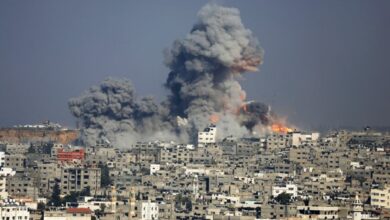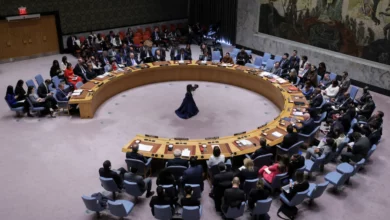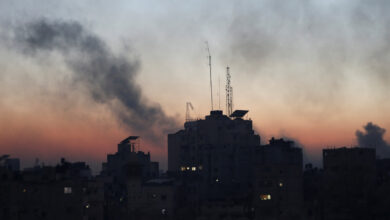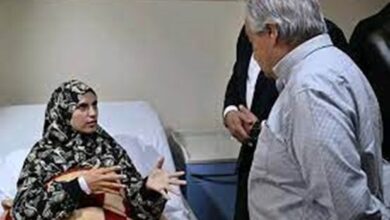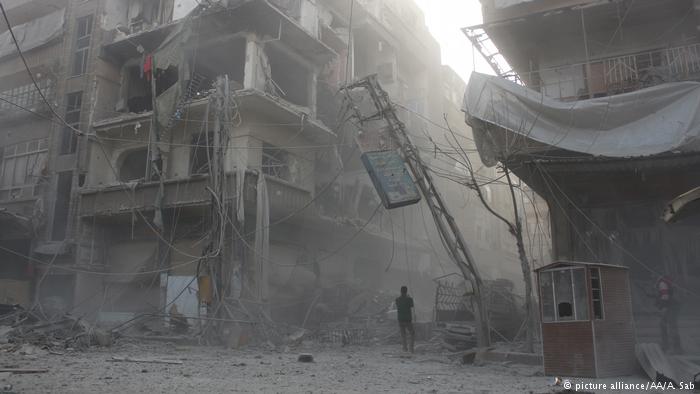
In a hospital in Eastern Ghouta, Bassam Bakri, an anesthesiologist is describing the suffering. “[Syrian President] Bashar al-Assad is bombing us incessantly,” he says. “He’s targeting hospitals and killing children.” He describes the shrapnel injuries suffered by the man he had been treating just minutes before.
“Ghouta is living underground,” he tells DW. “Our hospital has been bombed so we are operating in the basement.”
Under siege from early 2013, Eastern Ghouta in the Damascus suburbs is one of the Syrian war’s last remaining rebel enclaves. In a final push to regain the territory, the regime has been bombarding it for weeks. According to the Syrian Observatory for Human Rights, a monitor based in the UK, more than 600 people have been killed in the last two weeks.
A UN Security Council resolution for a 30-day ceasefire is officially in effect, but Ghouta’s residents say the shelling is continuing.
“We don’t believe the regime. Bashar al-Assad is a terrorist,” Bassam says of the Syrian president.
A mere 3 kilometers (1 mile) from Bassam’s house is the Old City of Damascus. As close as they may be geographically, the views held by Syrians living on the other side are diametrically opposed.
A different story just a few kilometers away
Ghoufran Derawan, an English teacher at the Institute of Foreign Languages at Damascus University, lost her sister to a mortar. When the missile struck, she was dining with her 18-month-old son and friends at a restaurant in Bab Touma, a Christian neighborhood just inside the Old City’s historic walls.
“Who are the moderate rebels in Ghouta? [They are ] only terrorists,” Ghoufran says. “They killed my baby nephew and sister, aren’t they terrorists?”
The uprising against the Assad regime may have begun with protests demanding reform and democracy, but the armed revolution is dominated by Islamists. In Eastern Ghouta, the two main groups are Jaysh al-Islam, a Salafi brigade funded by the Saudis, and Faylaq al-Rahman, which is aligned to the Muslim Brotherhood and has been backed by Qatar.
There is also some presence of Ahrar al-Sham, a hard-line Salafi group that is close to Turkey, and even of Hayat Tahrir al-Sham, which allegedly still has ties to al Qaeda.
Although Faylaq and Jaysh are both taking part in the Geneva peace process, sponsored by the United Nations, their ideologies and allies make it easy for the secular residents of Damascus to doubt their claims to be moderate.
Children suffering most in Eastern Ghouta
Ghoufran refuses to consider even the possibility that whatever the ideology of its enemies, it is the autocratic government that is most responsible for plunging Syria into chaos. The relentless bombing has battered the suburb beyond recognition.
“The terrorists are not letting the civilians get out and we want the world powers to ensure the civilians are evacuated,” she adds, in line with the regime’s position.
Bassam disagrees. He doesn’t mind Saudi and Qatari money and instead calls them allies. Bassam admits the women in his town wear hijab but rejects Ghoufran’s assertion that this is a form of oppression. He says women are free to work and that wearing hijab is a part of their religion.
He questions the suggestion that he must leave his home, his surroundings, and where he was born and opt for a life of destitution in a refugee camp — if not execution at the hands of the regime.
Before the government siege began in 2013, Ghouta was home to two million people. Fearing for their safety, hundreds of thousands left and joined millions of those internally displaced and the refugees heading to Turkey and Jordan, and ultimately Europe. Now, there are about 350,000-400,000 people in Eastern Ghouta struggling to survive.
Bassam’s family of six, comprising his mother, his wife and three children, survived on goods smuggled through tunnels leading to Damascus. “Two months ago the Syrian army bombed the tunnels,” he said. His family began to starve. “My children get food once a day or once in two days.”
For Ghoufran, the blame lies with the opposition. She accuses them of using children for propaganda.
Playing the blame game
When DW visited the Old City last year, bars and restaurants were up and running in Bab Touma. A group of youngsters were worried they could be hit by the sporadic rebel mortar fire and were recounting a similar “us versus them — terrorists versus Syrians” story.
In the middle of the night, the regime had launched a volley of rockets toward Jobar in Eastern Ghouta’s towns, effectively violating the de-escalation zone.
For the young boys and girls, the regime’s actions were acceptable — the right fight justified to end terrorism and the war.
Six months later, via encrypted communications, Ghoufran shared their views. She, like others, isn’t unsympathetic to the plight of fellow Syrians in Ghouta, but appears to be unaware of the extent of it.
Bassam agrees that Ghoufran is a victim of the war too. But he rejects the idea that the local rebels killed her sister just as much as she refuses to blame the regime for Ghouta’s plight.
If and when the war is over, it is hard to see how these two neighbors will reconcile.

